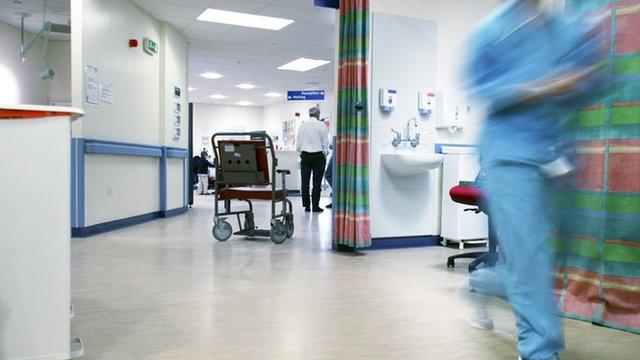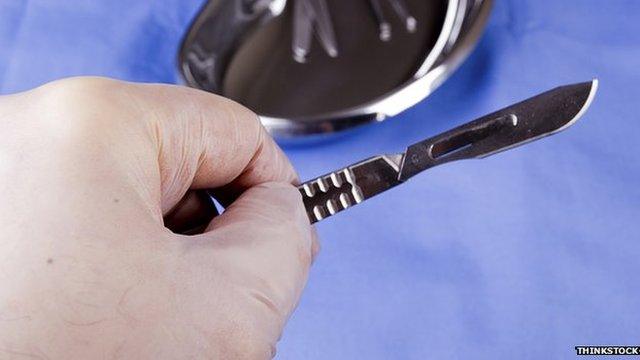What's the issue with mesh implants?
- Published
More than 400 women have received mesh and tape implants in Scotland since the health secretary called for their use to be suspended in June 2014. More than 20,000 women in Scotland have had the implants over the past 20 years, but some have suffered painful and debilitating complications. So what is the procedure, and why has it caused problems for some patients?

What are transvaginal mesh implants?

The implants are medical devices used by surgeons to treat pelvic organ prolapse and incontinence in women, conditions that can commonly occur after childbirth.
Some women with incontinence receive treatment using tension free vaginal tape, although adverse side effects are not thought to be as common.
The mesh, usually made from synthetic polypropylene, is intended to repair damaged or weakened tissue.
The implants have been widely used throughout the UK, Europe and North America, but in 2014 the Scottish government requested a suspension in their use by the NHS in Scotland, pending safety investigations.
It came after members of the Scottish Mesh Survivors, external campaign told a Holyrood committee of the "life-changing side effects" they had suffered.
The next year, Health Secretary Shona Robison apologised to women who were left in severe pain by operations to implant a surgical mesh. She also confirmed that the suspension would remain in place.
An independent review of the use of mesh implants was also set up but its chairwoman, Dr Lesley Wilkie, resigned earlier this month, external. The review's report, which is already overdue, had been expected to be published early next year.

What are the possible complications of mesh implants?

Members of the Scottish Mesh Survivors campaign gave evidence to the Scottish Parliament
Mesh implants have been used successfully in many other parts of the body, but appear to react differently when inserted in the abdomen, leading to some women being "cut".
A report by US regulatory body the Food and Drug Administration said once the mesh was implanted, it was very difficult - sometimes impossible - to remove.
Some women have reported severe and constant abdominal and vaginal pain following the surgery, and some have been told that they can no longer have sexual intercourse.
Other women have experienced infections and bleeding, while many have said their original incontinence symptoms have not been improved by the surgery.
Some women who experienced problems said they were not aware the implants were permanent.
There have also been calls for an investigation into allegations that counterfeit materials may have been used in mesh implants in Scotland - claims that have been strongly denied by the industry.

How many women have had the implant surgery?
Before the recommendation to suspend mesh implant use was made, about 1,850 women were said to have the surgery each year in Scotland, although it is unclear how many experienced problems.
Since then, the number of mesh implants being carried out has been reduced by more than 90%.
The Scottish Mesh Survivors campaign said in 2014 that 12 women had reported cases to the UK-wide Medicines and Healthcare Products Regulatory Agency (MHRA), while it is believed more than 300 women have undergone repeated operations in an attempt to resolve the problems.
Lindsay Bruce, of Thomsons solicitors, has said she has more than 140 clients taking cases forward, with reports earlier this year, external suggesting a total of 400 women were making damages claims against the NHS in Scotland.
The MHRA has said it believes between 1-3% of women having the procedure for stress urinary incontinence and 2-6% who receive an implant for pelvic organ prolapse suffer complications.
Some studies have suggested about 15% of patients having mesh implants suffer side effects, though the figures can be difficult to interpret because many of the women involved experienced problems before the surgery.

So why are women still being given mesh implants?

The review believes there needs to be clear clinical rules around the decision to use mesh surgery
Figures obtained by BBC Scotland in December 2016 showed that 404 mesh implants had been carried out in Scotland since the suspension was recommended.
Greater Glasgow and Clyde has used the implants more than any other health board - with 178 mesh and mesh tape implants - while NHS Lothian has performed 146.
The Scottish government said it had agreed with health boards that, if women were experiencing very distressing symptoms and wanted to proceed with an implant, then the service should still be offered.
This would only be done with the informed consent of the patient, following a full explanation and discussion of the potential risks.
A number of health boards - including Grampian, Ayrshire and Arran, and Tayside - have stopped using mesh implants altogether.
But in a report published in 2014, the MHRA said that, while a small number of women had experienced distressing effects, the benefits of tape and mesh implants outweighed the risks, external and could help in dealing with upsetting conditions.

Are mesh implants the only option?

Traditional surgery for a prolapsed bladder has a failure rate of 20-30%
Non-surgical treatments, including physiotherapy, are routinely offered to women suffering from a prolapsed bladder and/or incontinence. However, in more serious cases traditional surgery - which doesn't use implants - can be necessary.
However, such surgery has a 20-30% failure rate, which is why many women were offered the mesh implants as an alternative.
- Published6 October 2015

- Published17 June 2014

- Published3 June 2014

- Published11 March 2014
